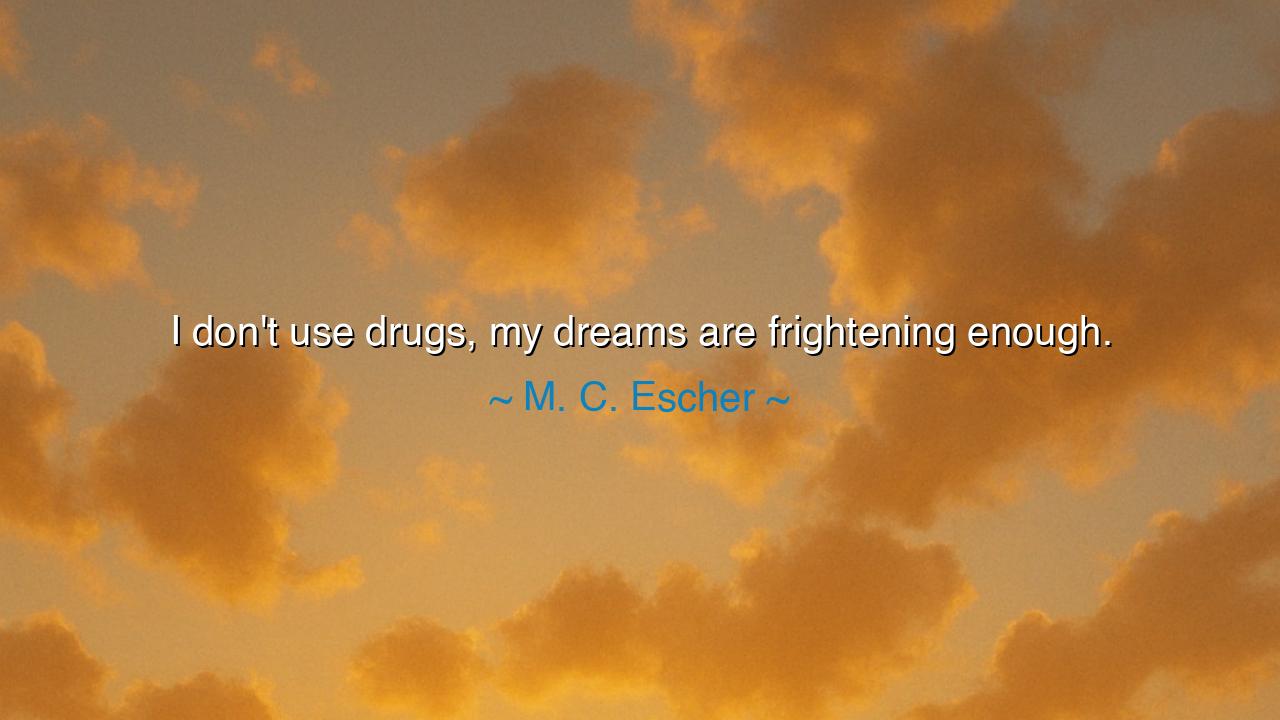
I don't use drugs, my dreams are frightening enough.






“I don’t use drugs, my dreams are frightening enough.” — thus spoke M. C. Escher, the Dutch master of impossible worlds, whose art bent the laws of nature and reason. In this stark and haunting line, Escher unveils the burden and blessing of a mind that sees too deeply. His words are not the jest of a cynic, but the confession of a visionary: one whose imagination is so vast, so ungoverned by ordinary boundaries, that it becomes both his inspiration and his torment. He speaks for all who live too vividly within the landscapes of their own thought — those for whom the mind itself is a wild country, where beauty and terror walk hand in hand.
The origin of this quote lies not in rebellion but in revelation. Escher, unlike many of his contemporaries, did not need the illusions of substances to open his inner eye. His art — stairs that climbed into themselves, waterfalls that defied gravity, hands that drew each other from the void — was born from a consciousness already unmoored from the ordinary. His dreams, as he called them, were labyrinths of perspective and paradox. In them, the waking world twisted upon itself until sense and nonsense became indistinguishable. For such a mind, intoxication was not escape but redundancy. He lived already at the edge of reality, where others glimpse only in trance or delirium.
To say “my dreams are frightening enough” is to acknowledge that creativity, in its truest form, is no gentle muse. The artist, the thinker, the seer — all who peer too deeply into the abyss of the possible — find there not only inspiration, but dread. For in the dream, the unconscious reveals its full power: unfiltered, unreasoning, infinite. Escher’s art is the reflection of that power — elegant yet unsettling, mathematical yet mystical. His dreams were not mere fantasies; they were confrontations with the architecture of existence itself, glimpses of eternity’s geometry. Such visions shake the soul, for they remind man how fragile is his grasp on order.
So too, throughout history, we find souls who have lived haunted by their own minds. Think of Nikola Tesla, the genius of light and current. He too saw visions — intricate machines, entire inventions — flashing before his eyes as if projected by some cosmic lantern. He could not control them; they came unbidden, fierce and blinding. For Tesla, as for Escher, the boundary between dream and reality was thin as glass. He once said that his inventions were “real in my mind as if they had substance,” yet the intensity of such sight drove him to solitude and near madness. His dreams, too, were “frightening enough.” They gave him the future — but they also stole his peace.
What Escher teaches, then, is the paradox of genius: that to see beyond the veil is both a gift and a burden. The ordinary man escapes his fears in illusion; the visionary faces them awake. While others seek expansion of mind through artificial means, the true seer walks already through worlds unseen. Yet such a path demands courage. To dwell among the images of the subconscious — to shape them, draw them, and bring them forth into daylight — requires the strength to confront what lies within. Escher’s words remind us that the real voyage is not outward but inward, and that within ourselves lie abysses far more powerful than any drug can conjure.
But his saying also bears a quiet warning. Many long for brilliance, yet few understand its price. The creative soul often walks alone, burdened by visions others cannot share or comprehend. He learns to build beauty from chaos, to transmute fear into art. Yet he must also guard his spirit — for to wander too far into the mind’s labyrinth without wisdom is to lose oneself. Thus, Escher’s statement, though sardonic, carries the wisdom of restraint: the awareness that the mind’s power must be revered, not trifled with.
And so, my listener, let this be your lesson: within you lies a world vast as Escher’s drawings — filled with stairways to wonder and chambers of fear. Do not seek to escape your mind, nor to dull its edges, but to understand it. When your dreams trouble you, listen — for they speak truths your waking self cannot bear to utter. When your imagination overwhelms you, shape it into creation. Write, paint, build, or speak what you see. For the greatest art and the deepest wisdom come not from fleeing the frightening dream, but from transforming it into meaning.
For truly, as M. C. Escher reminds us, the universe within is both terrifying and divine. To those who dare to face it — sober, conscious, and awake — the mind reveals its highest secret: that every nightmare contains a design, and every fear, when illuminated, becomes art.






AAdministratorAdministrator
Welcome, honored guests. Please leave a comment, we will respond soon